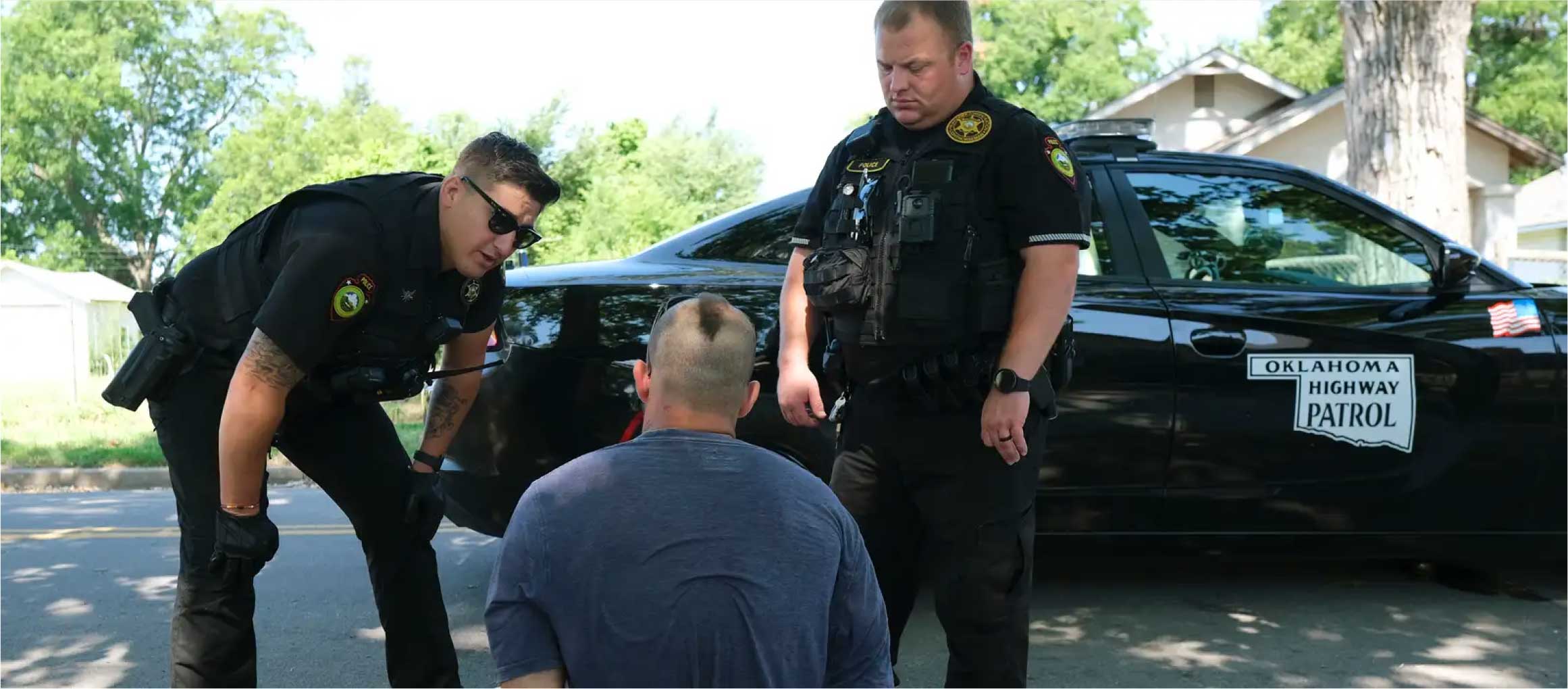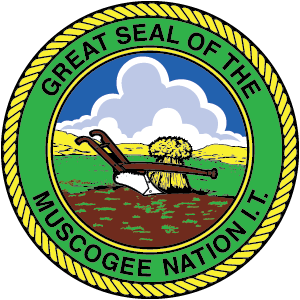McGirt v. Oklahoma, 3 years later: How police work on the Muscogee Nation reservation

Muscogee Nation Lighthorse Police Officers Daryl Wilson, left, and Kyle Johnson talk to a man arrested after running from police. DOUG HOKE/THE OKLAHOMAN
Molly Young
Oklahoman
Published 6am CT July 9, 2023
TULSA, Okla.—Officer Daryl Wilson puts on his Ray-Ban sunglasses and starts the “Black Stallion of Justice,” his nickname for the Dodge Durango he drives on patrol. His department-issued rifle rests next to the passenger seat. He finds his laptop and logs in to start another day on patrol for the Muscogee Nation Lighthorse Police.
Exactly three years ago, the U.S. Supreme Court handed down a decision that reshaped the criminal justice system in eastern Oklahoma. Justices ruled the Muscogee reservation still exists, meaning state courts could no longer prosecute crimes involving Native Americans on those lands.
State prosecutors and county sheriffs immediately decried the ruling, warning of the chaos it could create by disrupting how they had worked for decades. Gov. Kevin Stitt was even more vocal about how he thought it would divide the state. The decision triggered a litany of court fights to determine the limits of state powers on reservation lands, and those legal disputes continue to this day.
But leaders of the Muscogee Nation celebrate the ruling as a recognition of the tribe’s right to govern itself and keep people safe on its reservation, which encompasses most of Tulsa and east-central Oklahoma. The dire consequences state officials warned about have yet to come to pass, tribal officials say, as they’ve worked to expand the tribal police force and court system to handle the burgeoning new demands.
Wilson saw his tribe building up its police force and decided to apply. He started in January 2021, riding the waves of change as the police force more than doubled to 86 officers. He works out of a Lighthorse police station in Tulsa, fielding calls in the northern part of the reservation with three to five other officers at a time. When there are no calls in the queue, they go on out on patrol.
“I’ll drive around and try to be proactive,” Wilson says, “See if I can help out anywhere, look for traffic violations.”
Four hours into his shift, Wilson is navigating through the industrial and residential neighborhoods that run along the Arkansas River in the western outskirts of Tulsa. He spots an abandoned car on a side street behind a half-empty strip mall. He can see the car has no doors, tires or trunk. He turns around to check it out. A fellow Lighthorse Police officer, Kyle Johnson, parks behind him.
Johnson uses an app on his phone to run the vehicle information number. Wilson surveys what’s left — not much. The hood and engine are also gone. A Tulsa County sheriff’s deputy stops to ask if they need assistance. Then an Oklahoma Highway Patrol trooper does the same.
In Johnson’s view, more law enforcement means more ways to work together to keep people safe. Sometimes, the Lighthorse SWAT team backs up counties who do not have as many resources. Other times, they attend trainings together. Most often, they help one another out on routine calls.
“There’s no way we can survive without each other,” says Johnson, who joined Lighthorse Police a little more than a year ago after a decade working in the sheriff’s departments of Muskogee and Wagner counties. He hasn’t noticed many operational differences, except his new supervisors allowed him to work day shifts to accommodate his family schedule, something he considered unheard of for recent hires.
Can a tribal citizen be stopped by city police?
Johnson thinks there’s a disconnect between perception and reality of how state and tribal police agencies work together. Operating agreements allow the officers to conduct traffic stops and enforce laws regardless of whether or not someone is a tribal citizen, Johnson says. Then they forward their report to state court, tribal court or in some cases, federal court, for prosecution. “The only difference,” Johnson says, “is the box that the paperwork goes into.”
Still, some courts have refused to change how they operate. The Tulsa municipal city court continued to fine Native Americans for city code violations, such as speeding, instead of passing those tickets on to the Muscogee Nation courthouse in Okmulgee, 40 miles to the south.
But in late June, a federal appeals court ruled against Tulsa’s practice. Stitt responded with a new round of objections, tweeting an image of a fake road sign with two speed limits: 75 mph and a “tribal speed limit” of 100 mph. “We can’t have two sets of rules for Oklahomans,” Stitt wrote. “It’s that simple.”
There is no separate speed limit for tribal citizens. In a statement sent hours after Stitt’s tweet, Muscogee Nation Principal Chief David Hill noted that tribal police and Tulsa police have been working together since at least 2006 and will continue to do so. “The sky is not falling,” he said. “We know what to do.”
What happens when state police arrest a tribal citizen?
This morning, as Wilson and Johnson wait for a tow truck to haul the car remnants away, they don’t need any extra help. But as the state trooper gets ready to leave, a man drives by on a green ATV. The officers watch him cross onto a busier street where ATVs aren’t legal. The trooper follows him for a block until the man pulls onto a sidewalk and stops in front of a house. Then, the man starts running.
“There is a guy over here that is running from a state trooper on foot,” Wilson tells dispatchers as both he and Johnson drive over to help. “I’m going to assist.”
“Which direction did he go?” Johnson asks.
“Hey Kyle, he’s in the backyard over here,” Wilson replies.
The man stops running as officers close in. He’s handcuffed and walked to the trooper’s car. He tells them he’s a Cherokee Nation citizen. He thinks there is a warrant out for his arrest.
Later, the officers learn the man is facing drug charges in Muscogee Nation District Court and missed a May court hearing. He could face additional charges after the court receives the trooper’s report about the brief chase.
Before the 2020 Supreme Court decision, the tribal court handled about 100 pending criminal cases a year. Now, that number is close to 6,500. About a quarter of those cases are eventually set for trial, but as in the state court system, most are settled through plea agreements or other avenues before they make it to a jury.
More officers arrive to the scene of the Tulsa arrest and begin canvassing the neighborhood for anything the man might have tossed. As they search, the man starts dozing off in the car. Officers believe he might have taken drugs. A few officers help him out of the car and onto the curb.
Wilson talks him through a list of questions. Did you take anything? How are you feeling? Where does it hurt? Have you ever had a heart attack? Do you know what a heart attack feels like?
With each question, the man says less. “What’s your name again?” He doesn’t answer.
Two paramedics arrive to check his vitals. They load him onto a gurney, into their ambulance and begin driving away.
Neighbors who had come out to watch start going back inside. One woman asks Wilson if he has any police stickers for the kids, since they had just watched reality TV play out in front of their home. Wilson isn’t sure he has any stickers. He looks inside his SUV and finds some. He walks back to hand them to her.
Then, Wilson returns to his vehicle and tells dispatch he can be assigned to another call.
Molly Young covers Indigenous affairs. Reach her at zbyyllbhat@tnaargg.pbz or 405-347-3534.
###




